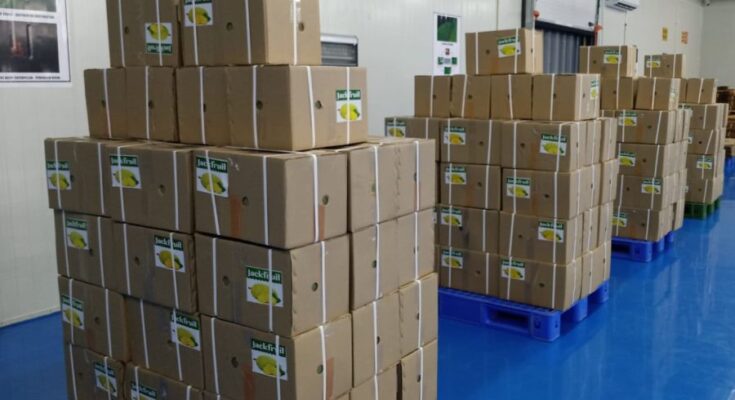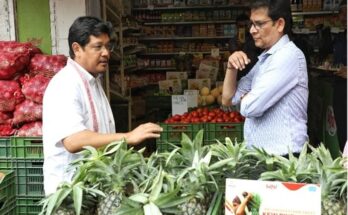India’s agricultural and processed food exports have grown at a steady pace in the last decade notwithstanding several logistical challenges faced in the global trade of the commodities.
Exports of agricultural and processed food products under the Agricultural and Processed Food Products Export Development Authority (APEDA) basket rose to USD 20,674 million (Rs 153,050 crore) during 2020-21, from USD 17,321 million (Rs 83,484 crore) in 2011-12, according to data by the Directorate General of Commercial Intelligence and Statistics (DGCI&S).
Non-basmati rice has emerged as India’s top export item among the many agricultural and processed food product exports under the APEDA basket, contributing close to one-fourth of the total exports in 2020-21.
The top three products in the APEDA export basket in 2020-21 were non-basmati rice (23.22% share), basmati rice (19.44%) and buffalo meat (15.34%) and these products together account for 58 per cent of total shipments.
India’s non-basmati rice exports were valued at USD 4799.91 million (Rs 35,477 crore) in 2020-21, with basmati rice exports a close second at USD 4018.71 million (Rs 29,850 crore), followed by buffalo meat exports at USD 3171.19 million (Rs23,460 crore).
Benin, Nepal, Bangladesh, Senegal and Togo were the top importers of non-basmati rice from India in 2020-21. Major export destinations for basmati rice in 2020-21 were Saudi Arabia, Iran, Iraq, Yemen and the United Arab Emirates. For buffalo meat exports, the top importing nations were Hong Kong, Vietnam, Malaysia, Egypt and Indonesia.
“We continue to focus on creating infrastructure for boosting exports by focusing on clusters in collaboration with state governments while taking into consideration aim of Agriculture Export Policy, 2018,” Dr M Angamuthu, Chairman, APEDA, said.
You may also like to read: Here’s the facts about Kisan Rails transporting of agricultural commodities
APEDA has been engaged with state governments for the implementation of the Agriculture Export Policy. Maharashtra, Uttar Pradesh, Kerala, Nagaland, Tamil Nadu, Assam, Punjab, Karnataka, Gujarat, Rajasthan, Andhra Pradesh, Telangana, Manipur, Sikkim, Uttarakhand, Madhya Pradesh., Mizoram and Meghalaya have finalised the state-specific action plans for exports while the action plans of other states are at different stages of finalisation.
India’s agricultural exports in value proportion
According to World Trade Organization (WTO) data, India’s agricultural exports touched USD 37,371 million in 2019 against USD 23,106 million in 2010, recording a compounded annual growth rate (CAGR) of 5.49 per cent during the last 10 years. CAGR of the world’s agricultural exports was 3.11 per cent from 2010 to 2019.
India’s share in world agricultural exports stood at 2.1 per cent in 2019, moving up from 1.71 per cent in 2010. However, India’s rank in worldwide agricultural exports slipped to 16 in 2019 from 17 in 2010, according to data released by the World Trade Organization (WTO).
Commodity share
In terms of share of top 10 products exports under APEDA basket, there has not been much change in the last one decade even as India’s exports reached more countries across the world. The top 10 APEDA exports in share terms in 2020-21 were non-basmati rice (23.22%), basmati rice (19.44%), buffalo meat (15.34%), miscellaneous preparations (3.84%), groundnuts (3.52%), cereal preparations (3.08%), maize (3.07%), wheat (2.66%), processed vegetables (2.43%), processed fruits, juices and nuts (2.07%) and cashew kernels (2.03%).
In 2011-12, the top 10 APEDA export in share terms were guargum (19.89%), basmati rice (18.60%), buffalo meat (16.56%), non-basmati rice (10.43%), groundnuts (6.32%), maize (6.21%), cereal preparations (2.26%), fresh onions (2.07%), alcoholic beverages (1.76%) and processed vegetables (1.47%).
In 2020-21, the top 10 products in the APEDA export basket account for more than 78 per cent in total exports against 85 per cent in 2010-11.
The growth story
Top 10 APEDA exports in value terms during 2020-21 were non-basmati rice (USD 4799.91 million / Rs 35,477 crore), basmati rice (USD 4018.71 million / Rs 29,850 crore), buffalo meat (USD 3171.19 million / Rs 23,460 crore), miscellaneous preparations (USD 793.08 million / Rs 5,866 crore), groundnuts (USD 727.4 million / Rs 5,382 crore), cereal preparations (USD 635.75 million / Rs 4,706 crore), maize (USD 634.85 million / Rs 4,676 crore), wheat (USD 549.7 million / Rs 4,038 crore), processed vegetables (USD 502 million / Rs 3,719 crore) and processed fruits, juices and nuts (USD 428 million / Rs 3,173 crore).
Top 10 APEDA exports in value terms during 2011-12 were guargum (USD 3446.37 million / Rs 16,524 crore), basmati rice (USD 3222.31 million / Rs 15,450 crore), buffalo meat (USD 2869.36 million / Rs 13,757 crore), non-basmati rice (USD 1806.03 million / Rs 8,659 crore), groundnuts (USD 1094.25 million / Rs 5,246 crore), maize (USD 1075.7 million / Rs 5,158 crore), cereal preparations (USD 392.21 million / Rs 1,889 crore), fresh onions (USD 359.36 million / Rs 1,723 crore), alcoholic beverages (USD 304.4 million / Rs 1,459 crore) and processed vegetables (USD 254.56 million / Rs 1,250 crore).
APEDA initiatives in promoting agri exports
The rise in export of agricultural and processed food products has been largely due to the various initiatives taken by APEDA such as organising B2B exhibitions in different countries, exploring new potential markets through product-specific and general marketing campaigns by the active involvement of Indian embassies.
APEDA has also taken several initiatives to promote geographical indications (GI) registered agricultural and processed food products in India by organising virtual buyer-seller meets on agricultural and food products with the major importing countries across the world.
You may also like to read: Mustard production expected to touch record 110 lakh tonnes in Rabi season
In order to ensure seamless quality certification of products to be exported, APEDA has recognised 220 labs across India to provide services of testing to a wide range of products and exporters.
APEDA also assists in the up-gradation and strengthening of recognised laboratories for export testing and residue monitoring plans. APEDA also provides assistance under the financial assistance schemes of infrastructure development, quality improvement and market development for boosting the export of agricultural products.
APEDA organises the participation of exporters in the International Trade Fairs, which provides a platform to the exporters to market their food products in the global marketplace. APEDA also organises national events like AAHAR, Organic World Congress, BioFach India among other related activities to promote agri-exports.
APEDA also initiates the registration of pack-houses for horticulture products for meeting the quality requirements of the international markets. Registration of export units for peanut shelling and grading and processing units, for instance, is to ensure quality adherence for the EU and non-EU countries.
APEDA carries out registration of meat processing plants and abattoirs for ensuring compliance with global food safety and quality requirements. Another key initiative includes the development and implementation of traceability systems that ensure the food safety and quality compliances of the importing countries. For boosting exports, APEDA compiles and disseminates various international trade analytical information, market access information amongst exporters and address trade enquiries.
Agricultural export trend
| Year | Rs Crores | USD Million |
| 2011-12 | 83484 | 17321 |
| 2012-13 | 118251 | 21740 |
| 2013-14 | 136921 | 22707 |
| 2014-15 | 131343 | 21489 |
| 2015-16 | 107483 | 16421 |
| 2016-17 | 113858 | 17022 |
| 2017-18 | 125858 | 19524 |
| 2018-19 | 135113 | 19407 |
| 2019-20 | 119401 | 16700 |
| 2020-21 | 153050 | 20674 |
Source: Directorate General of Commercial Intelligence and Statistics




